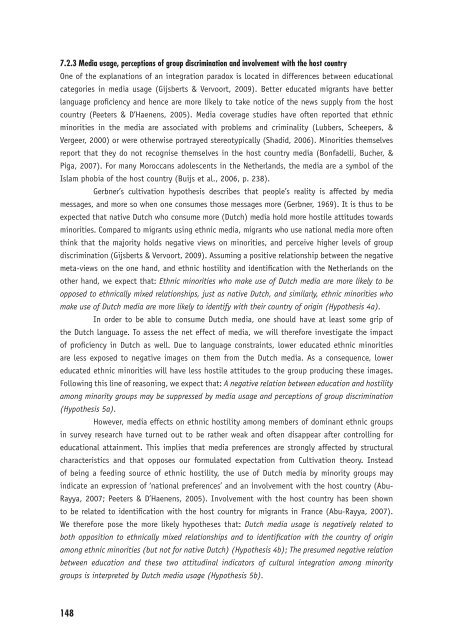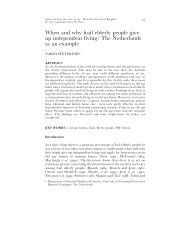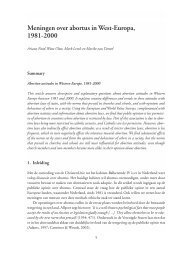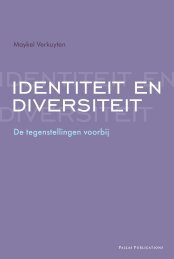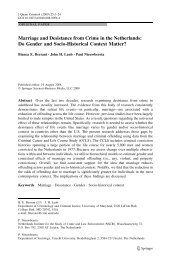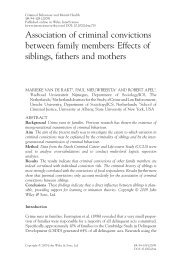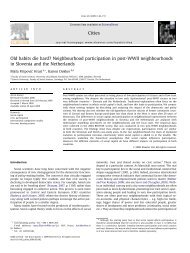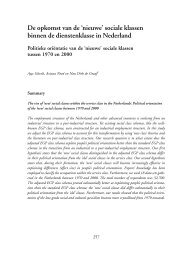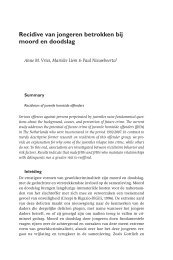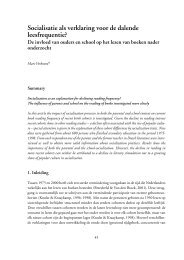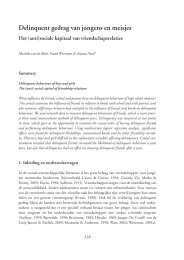Ethnic Hostility among Ethnic Majority and Minority Groups
Ethnic Hostility among Ethnic Majority and Minority Groups
Ethnic Hostility among Ethnic Majority and Minority Groups
Create successful ePaper yourself
Turn your PDF publications into a flip-book with our unique Google optimized e-Paper software.
7.2.3 Media usage, perceptions of group discrimination <strong>and</strong> involvement with the host country<br />
One of the explanations of an integration paradox is located in differences between educational<br />
categories in media usage (Gijsberts & Vervoort, 2009). Better educated migrants have better<br />
language profi ciency <strong>and</strong> hence are more likely to take notice of the news supply from the host<br />
country (Peeters & D’Haenens, 2005). Media coverage studies have often reported that ethnic<br />
minorities in the media are associated with problems <strong>and</strong> criminality (Lubbers, Scheepers, &<br />
Vergeer, 2000) or were otherwise portrayed stereotypically (Shadid, 2006). Minorities themselves<br />
report that they do not recognise themselves in the host country media (Bonfadelli, Bucher, &<br />
Piga, 2007). For many Moroccans adolescents in the Netherl<strong>and</strong>s, the media are a symbol of the<br />
Islam phobia of the host country (Buijs et al., 2006, p. 238).<br />
Gerbner’s cultivation hypothesis describes that people’s reality is affected by media<br />
messages, <strong>and</strong> more so when one consumes those messages more (Gerbner, 1969). It is thus to be<br />
expected that native Dutch who consume more (Dutch) media hold more hostile attitudes towards<br />
minorities. Compared to migrants using ethnic media, migrants who use national media more often<br />
think that the majority holds negative views on minorities, <strong>and</strong> perceive higher levels of group<br />
discrimination (Gijsberts & Vervoort, 2009). Assuming a positive relationship between the negative<br />
meta-views on the one h<strong>and</strong>, <strong>and</strong> ethnic hostility <strong>and</strong> identifi cation with the Netherl<strong>and</strong>s on the<br />
other h<strong>and</strong>, we expect that: <strong>Ethnic</strong> minorities who make use of Dutch media are more likely to be<br />
opposed to ethnically mixed relationships, just as native Dutch, <strong>and</strong> similarly, ethnic minorities who<br />
make use of Dutch media are more likely to identify with their country of origin (Hypothesis 4a).<br />
In order to be able to consume Dutch media, one should have at least some grip of<br />
the Dutch language. To assess the net effect of media, we will therefore investigate the impact<br />
of profi ciency in Dutch as well. Due to language constraints, lower educated ethnic minorities<br />
are less exposed to negative images on them from the Dutch media. As a consequence, lower<br />
educated ethnic minorities will have less hostile attitudes to the group producing these images.<br />
Following this line of reasoning, we expect that: A negative relation between education <strong>and</strong> hostility<br />
<strong>among</strong> minority groups may be suppressed by media usage <strong>and</strong> perceptions of group discrimination<br />
(Hypothesis 5a).<br />
However, media effects on ethnic hostility <strong>among</strong> members of dominant ethnic groups<br />
in survey research have turned out to be rather weak <strong>and</strong> often disappear after controlling for<br />
educational attainment. This implies that media preferences are strongly affected by structural<br />
characteristics <strong>and</strong> that opposes our formulated expectation from Cultivation theory. Instead<br />
of being a feeding source of ethnic hostility, the use of Dutch media by minority groups may<br />
indicate an expression of ‘national preferences’ <strong>and</strong> an involvement with the host country (Abu-<br />
Rayya, 2007; Peeters & D’Haenens, 2005). Involvement with the host country has been shown<br />
to be related to identifi cation with the host country for migrants in France (Abu-Rayya, 2007).<br />
We therefore pose the more likely hypotheses that: Dutch media usage is negatively related to<br />
both opposition to ethnically mixed relationships <strong>and</strong> to identifi cation with the country of origin<br />
<strong>among</strong> ethnic minorities (but not for native Dutch) (Hypothesis 4b); The presumed negative relation<br />
between education <strong>and</strong> these two attitudinal indicators of cultural integration <strong>among</strong> minority<br />
groups is interpreted by Dutch media usage (Hypothesis 5b).<br />
148


